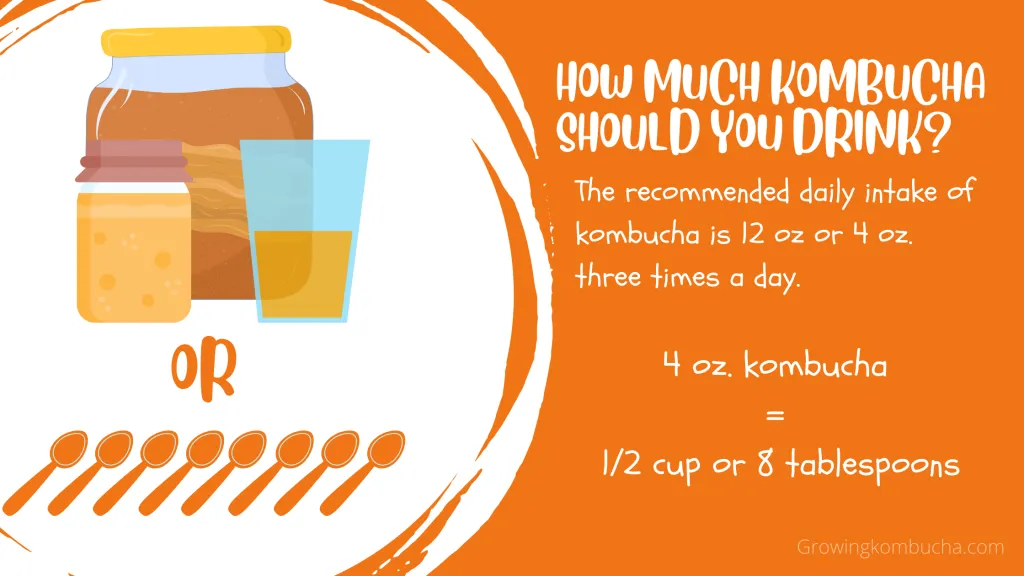Kombucha is one of the health drinks gaining the spotlight these past few years. It’s known for its gut-health benefits and addicting fizzy sweet and sour flavor. So, many of its fans often ask the question, how much kombucha should I drink?. As we all know, anything that’s too much can also throw off some balance in your body.
Like kimchi and yogurt, kombucha is a probiotic from fermented tea which contains yeast and live bacteria that are good for your gut. It also contains acid and alcohol that can set off some mild and even life-threatening conditions.
Before adding a few cups of kombucha to your daily diet, It’s essential to check first how kombucha affects your body. Learn how your ability to reap the benefits from drinking kombucha depends on your body’s tolerance and the quality of the kombucha.
What does kombucha do to your body?
Kombucha rose in popularity as more people are now looking for healthier alternatives. The health benefits of kombucha lie in its ingredients, such as green or black tea, SCOBY, and organic acids.
The fermentation process of kombucha helps enhance the antioxidants and vitamins that help provide the following health benefits:
- Reduces inflammation: Green and black tea contain polyphenols that help reduce inflammation. Inflammation in the body is one of the leading causes of chronic diseases today like diabetes and hypertension.
- Promotes gut health: The live bacteria in kombucha helps provide a balance between the good and bad bacteria in our gut. It helps improve your digestion and reduce your risk for gut-related diseases. Since kombucha is a probiotic, it helps relieve Irritable bowel syndrome (IBS), diarrhea, and constipation.
- Helps fight bad bacteria: The acids B vitamins that form during kombucha fermentation contain anti-microbial properties that fight disease-causing bacteria. They also help to detoxify the liver from toxins and unhealthy compounds.
- Helps lower bad cholesterol and high blood pressure: A study in 2003 shows that the polyphenols in kombucha help inhibit pancreatic processes that prevent the absorption of bad cholesterol. They also help improve the inner lining of blood vessels and promote anti-platelet processes.
How much kombucha should I drink daily?
With all the goodness found in kombucha, you’re probably sold in including it in your diet. According to the CDC, the daily recommended intake of kombucha is 12 oz., with 4 oz. cup consumed three times a day. Drinking kombucha in moderation is key in getting the most benefits out of it.

Kombucha contains acids, such as acetic, glucuronic, D-Saccharic acids, and alcohol. The excessive intake of acids found in kombucha can upset the stomach of someone who’s not fond of probiotics. You should also monitor your kombucha consumption if you’re:
- Caffeine-sensitive: Green or black tea contains caffeine that may trigger sleep problems in people with insomnia and other sleep conditions.
- Sensitive to alcohol: During kombucha fermentation, yeast converts sugar into ethanol. Kombucha contains about 0.3% to 0.5% of alcohol that may impact the sobriety of recovering alcoholics or alcohol-dependent individuals.
- Allergic to yeast: People with severe allergies should monitor their condition after drinking kombucha since kombucha contains yeast. It may cause upset stomach and diarrhea for those who have yeast allergies.
Who should avoid drinking kombucha?
Though kombucha is packed with nutrients and good bacteria, it also contains alcids and alcohol that can be dangerous for some people. Patients who are immuno-compromised, pregnant, and lactating mothers should avoid drinking kombucha.
The maintenance medications for diabetes and cardiovascular conditions must, at least, avoid consuming kombucha as it may counteract their medications. In 1995, a 63-year-old woman with several underlying conditions died due to severe metabolic acidosis in her blood after drinking kombucha every day.
What are the side effects of kombucha?
Kombucha is a fermented product where you mix liquid and bacteria in yeast. The process requires a sterile environment to ensure the quality and safety of kombucha. Otherwise, it can lead to contamination and result in mold and fungi formation or overproduction of yeast.
Excessive consumption of quality and safe kombucha can also lead to mild to serious side kombucha side effects, which include:

1. Sleep and anxiety problems
If you have insomnia, anxiety, or somehow notice that you have a caffeine addiction, consuming too much kombucha may worsen your condition. Store-bought kombucha like GT’s contains 4 to 7 mg of caffeine in every four ounces of kombucha.
You may experience palpitations, jitters, and worse panic attacks due to excessive caffeine in your blood. Your sleep may also be disrupted, which will keep you awake at night and sleepy during the day.

2. Upset stomach and bloating
Your untrained stomach to probiotics may find it hard to handle the excessive influx of sugar and FODMAP in your body. Kombucha is also carbonated, which can cause an accumulation of gas in your stomach, leading to bloating.

3. Risky for recovering and recovered alcoholics
Even a minuscule amount of alcohol can throw off years of sobriety for recovering alcoholics. Though kombucha only contains about 0.3% to 0.5% of ethanol, it can be too risky to take for sober individuals, especially for those who are just starting their journey to recovery.
An addiction treatment facility in Chicago recommends absolute abstinence of any alcohol for people in sobriety. Therefore, despite its health benefits, kombucha is too risky for alcohol-dependents and recovering alcoholics.

4. Life-threatening conditions
The accumulation of too much acid from kombucha may lead to ketoacidosis or lactic acidosis. They are blood conditions where there is too much acid in the blood. They are life-threatening conditions that, when not treated immediately, can lead to death.
Frequently Asked Questions (FAQs)
How much kombucha should I drink for gut health?
Kombucha is a potent probiotic. Therefore, you can only consume at least 1 cup (4 oz.) or a maximum of 3 (12 oz.) cups of kombucha every day to see its advantage on your gut health. The CDC-recommended daily intake is 12 oz. a day, and going beyond that can cause some side effects.
How much kombucha should I drink a day for weight loss?
For weight loss, drink an 8 oz. of green tea-based kombucha after drinking water in the morning. Kombucha contains acetic acid and catechins from green tea that aids in weight loss. It only contains an average of 30 calories, making it an ideal alternative to high-calorie fruit juices.
How much kombucha is too much in a day?
Beyond 12 oz. a day is too much when it comes to kombucha. It is a fermented beverage that contains acids and alcohol, which should be consumed moderately. Otherwise, you might experience mild to serious side effects.
How much kombucha should a beginner drink?
For the untrained stomach, drinking 4 oz. or 1 cup a day is enough for the body to get used to kombucha. Increase your consumption gradually until your tolerance increases and reaches the recommended limit of 12 oz. a day.
